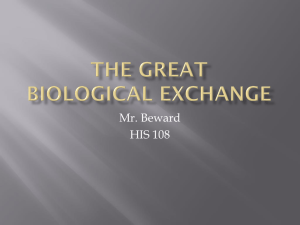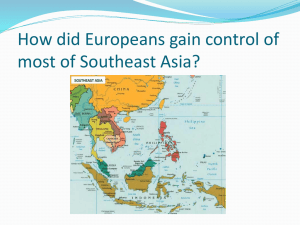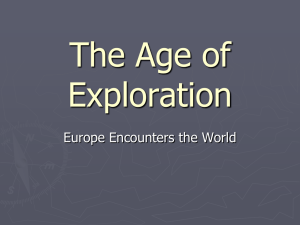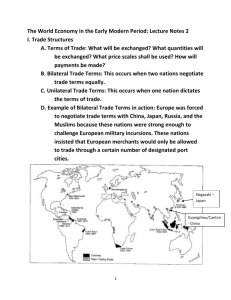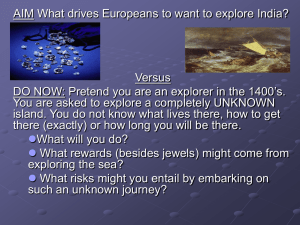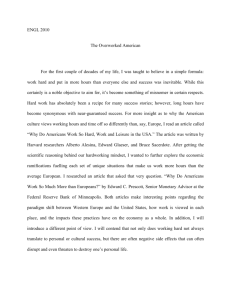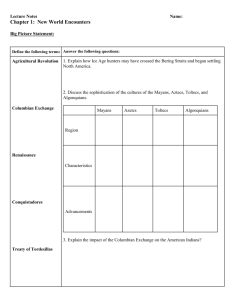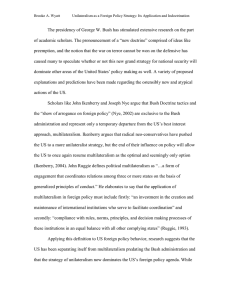Power-and-Weakness_Robert-Kagan
advertisement
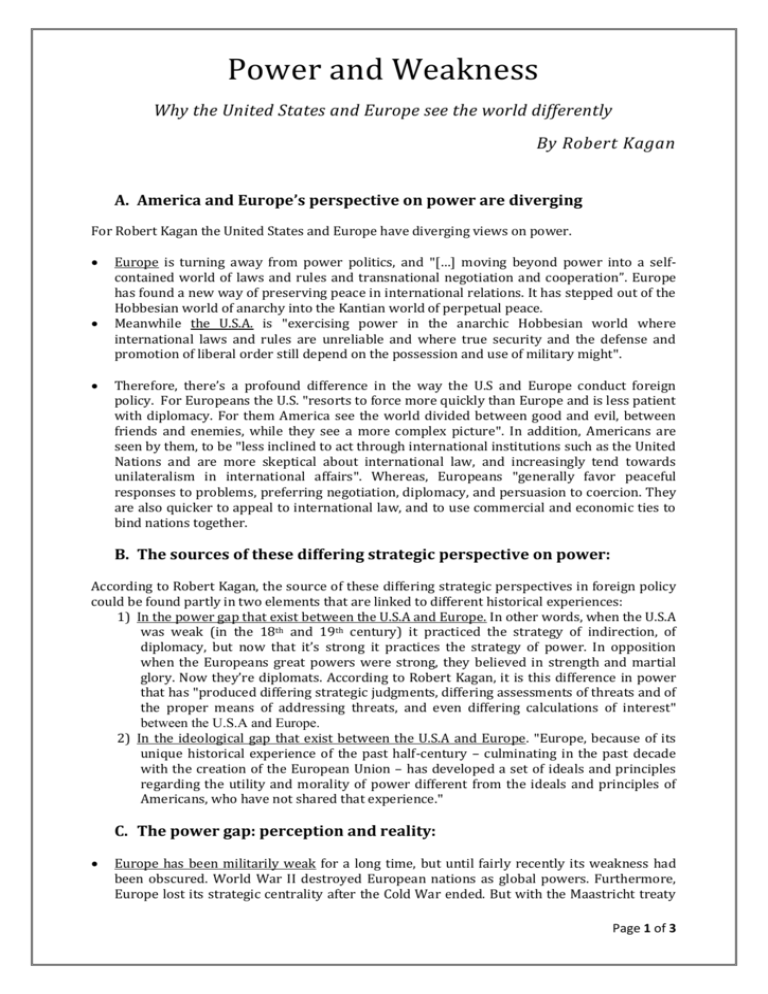
Power and Weakness Why the United States and Europe see the world differently By Robert Kagan A. America and Europe’s perspective on power are diverging For Robert Kagan the United States and Europe have diverging views on power. Europe is turning away from power politics, and "[…] moving beyond power into a selfcontained world of laws and rules and transnational negotiation and cooperation”. Europe has found a new way of preserving peace in international relations. It has stepped out of the Hobbesian world of anarchy into the Kantian world of perpetual peace. Meanwhile the U.S.A. is "exercising power in the anarchic Hobbesian world where international laws and rules are unreliable and where true security and the defense and promotion of liberal order still depend on the possession and use of military might". Therefore, there’s a profound difference in the way the U.S and Europe conduct foreign policy. For Europeans the U.S. "resorts to force more quickly than Europe and is less patient with diplomacy. For them America see the world divided between good and evil, between friends and enemies, while they see a more complex picture". In addition, Americans are seen by them, to be "less inclined to act through international institutions such as the United Nations and are more skeptical about international law, and increasingly tend towards unilateralism in international affairs". Whereas, Europeans "generally favor peaceful responses to problems, preferring negotiation, diplomacy, and persuasion to coercion. They are also quicker to appeal to international law, and to use commercial and economic ties to bind nations together. B. The sources of these differing strategic perspective on power: According to Robert Kagan, the source of these differing strategic perspectives in foreign policy could be found partly in two elements that are linked to different historical experiences: 1) In the power gap that exist between the U.S.A and Europe. In other words, when the U.S.A was weak (in the 18th and 19th century) it practiced the strategy of indirection, of diplomacy, but now that it’s strong it practices the strategy of power. In opposition when the Europeans great powers were strong, they believed in strength and martial glory. Now they’re diplomats. According to Robert Kagan, it is this difference in power that has "produced differing strategic judgments, differing assessments of threats and of the proper means of addressing threats, and even differing calculations of interest" between the U.S.A and Europe. 2) In the ideological gap that exist between the U.S.A and Europe. "Europe, because of its unique historical experience of the past half-century – culminating in the past decade with the creation of the European Union – has developed a set of ideals and principles regarding the utility and morality of power different from the ideals and principles of Americans, who have not shared that experience." C. The power gap: perception and reality: Europe has been militarily weak for a long time, but until fairly recently its weakness had been obscured. World War II destroyed European nations as global powers. Furthermore, Europe lost its strategic centrality after the Cold War ended. But with the Maastricht treaty Page 1 of 3 in 1992, Europe hoped to regain its old greatness through a new political form. Some even went on to say that “Europe would be the next superpower, not only economically and politically, but also militarily", which would restore the global "multipolarity" that had been destroyed by the Cold War and the rise of the American hegemony. But this was not the case and instead the 1990s witnessed not the rise of a European superpower but the decline of Europe into relative weakness. And this could be seen in the Balkan conflict at the beginning of the decades which revealed European military incapacity and political disarray, or the Kosovo conflict at decade’s end, which exposed a transatlantic gap in military technology. In other words, in these conflicts the European role was limited to filling out peacekeeping forces after the United States had, largely on its own, carried out the decisive phases of a military mission and stabilized the situation. Basically, after the Cold War, Europeans could not pay for sufficient force to conduct even minor military actions on the continent without American help, and therefore, throughout the 1990s European military capacities steadily fell (below 2% of the gdp) behind those of the U.S. America came out of World War II in strength and this strength increased to the rest of the world, with the collapse of the Soviet empire at the end of the Cold War. This "unipolar moment" made the United States more willing to use force abroad. With the check of Soviet power removed, the U.S was free to intervene practically wherever and whenever they chose to (ex. Invasion of Panama in 1989, the Persian Gulf War in 1991, humanitarian intervention in Somalia in 1992, interventions in Haiti, Bosnia, and Kosovo, etc.). D. The consequences of this power gap on foreign policies: The transatlantic power gap created a difference in strategic perceptions. In the sense that, American military predominance and Europe’s relative weakness produced important and sometimes serious disagreements, even during the Cold War. For Europeans, America’s approach to the Cold War was too confrontational, too militaristic, and too dangerous. Europeans believed they knew better how to deal with the Soviets: through engagement and seduction, through commercial and political ties, through patience and forbearance. The end of the Cold War, by widening the power gap, exacerbated the disagreements. It was during the Clinton years that Europeans began complaining about being lectures by the "hectoring hegemon". And it was also during the 1990s that the transatlantic disagreement over American plans for missile defense emerged and many Europeans began grumbling about the American propensity to choose force and punishment over diplomacy and persuasion. And that apprehension would only increase in the wake of American military action after September 11, 2001. Not only did this transatlantic power gap create differences in strategic perceptions, but it also gave rise to a psychology of power and weakness. Meaning that American military strength has produced a propensity to use that strength. Europe’s military weakness has produced a perfectly understandable aversion to the exercise of military power. Indeed, it has produced a powerful European interest in inhabiting a world where strength doesn’t matter, where international law and international institutions predominate, where unilateral action by powerful nations is forbidden, where all nations regardless of their strength have equal rights and are equally protected by commonly agreed-upon international rules of behavior. This is what weaker powers have wanted from time immemorial. It was what Americans wanted in the 18th and early 19th centuries, when the brutality of a European system of power politics run by the global giants of France, Britain, and Russia left Americans constantly vulnerable to imperial thrashing. So because of Europe’s fear of America’s unilateralism, their goal has become the "multilateralising" of the United States, in order to constrain American power without wielding power themselves. There’s a different perspective between the U.S and Europe on the role of power in international affairs. Europeans oppose unilateralism in part because they have no capacity for unilateralism, whereas, the U.S act unilaterally when it was of its interest to do so and when there are more payoffs in doing so than costs. Page 2 of 3 Americans and Europeans can agree on the kind of world order they would strive to build, however, they increasingly disagree about what constitutes a threat to that international endeavor. For Robert Kagan, Europe is more tolerant to threat than U.S. because of its relative weakness. For instance the threat caused by Saddam Hussein is more tolerable for Europe than the risk of removing him, because their weak, whereas, Americans being stronger, and being capable of acting on the situation, had a lower threshold of tolerance for Saddam and his weapons of mass destruction, especially after September 11. Therefore, according to Kagan, the incapacity to respond to threats leads not only to tolerance but sometimes to denial. In addition to this, for Kagan, Europe relies on America to intervene if ever a real danger emerges. The United States play the role of ultimate enforcer in most regions of the world (including in Europe). E. The need for power politics by the U.S. The European experience of integration demonstrates to the world, according, to European Commission President Romano Prodi, that it’s possible to create a method for peace. And this formula could work, according to many Europeans, with the so called “rogue” states. The transmission of the European miracle to the rest of the world has become Europe’s new mission civilisatrice. In that sense, America’s power, and its willingness to exercise that power– unilaterally if necessary- represents a threat to Europe’s new sense of mission. But European integration was also an American project after World War II. In fact the two reasons that favored the European integration are the following: 1) The presence of American forces as a security guarantee in Europe, against external and internal threats. 2) France’s and Germany’s commitment to the principle of integration, beginning with economic links. Therefore, the U.S by providing security from outside has enabled Europe to achieve and preserve peace without the need of power from its supranational government. In other words, Europe’s Kantian order could flourish only under the umbrella of American power exercised according to the rules of the old Hobbesian order. Because Europe has neither the will nor the ability to guard its own paradise and keep it from being overrun, spiritually as well as physically, by a world that has yet to accept the rule of "moral consciousness", it has become dependent on America’s willingness to use its military might to deter or defeat those around the world who still believe in power politics. And it’s because of this situation that America can’t enter the Kantian paradise. In fact, for Americans the existence of international laws and principles to regulate international behaviors is only possible because of the existence of a power like them, to defend it by force of arms. The problem being that the U.S must sometimes play by the rules of a Hobbesian world, even though in doing so it violates European norms. It must live by a double standard. And it must sometimes act unilaterally, not out of a passion for unilateralism but, but given a weak Europe that has moved beyond power, because the United Sates has no choice but to act unilaterally. F. Conclusion: For the diverging perspective on power between Europe and the United Sates to decrease, Europe should build up its military capabilities, even if only marginally. Europe should also appreciate the existence of a strong and powerful America, because it is a necessity for the world and especially for Europe. Americans on the other hand, are powerful enough that they need not fear Europeans, even when bearing gifts. American leaders should realize that they are hardly constrained at all, that Europe is not really capable of constraining the United States. Nevertheless, America and Europe still share common Western beliefs. Their aspirations for humanity are much the same, even though their differing perspective on the role of power. Page 3 of 3
